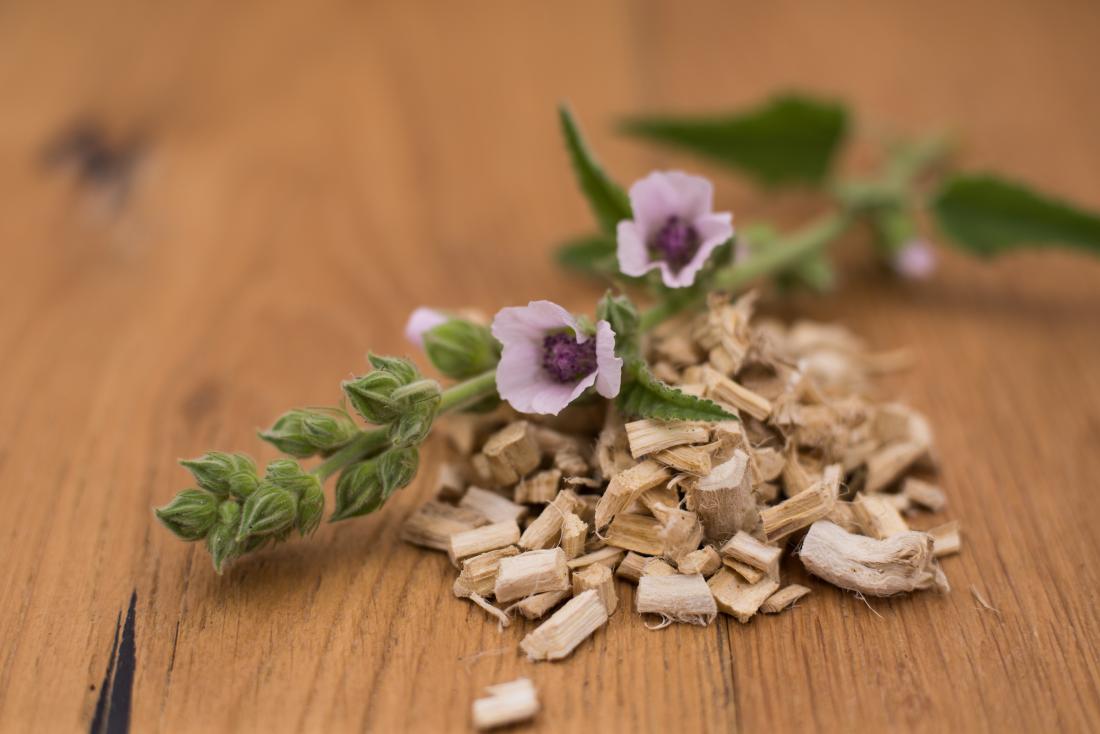Marshmallow Root (Althaea officinalis): A Soothing Herbal Remedy
Marshmallow root, scientifically known as Althaea officinalis, is a perennial herb that has been used for centuries for its medicinal properties. It is native to Europe, North Africa, and Western Asia and is characterized by its beautiful pink flowers and its thick, fleshy root. Marshmallow root has a long history of use in traditional medicine, particularly for its soothing and healing effects on the respiratory and digestive systems. In this article, we will explore the fascinating properties of marshmallow root, its historical uses, chemical constituents, and potential health benefits.
Botanical Features:
Marshmallow is a tall, perennial herb that can reach a height of up to 4 feet. It has a thick, woody stem and velvety, heart-shaped leaves that are grayish-green in color. The plant produces clusters of pale pink or white flowers that bloom during the summer months. The root of the marshmallow plant is the part that is most commonly used for medicinal purposes.
Historical Uses:
Marshmallow root has a rich history of use in various traditional systems of medicine. Ancient Egyptians used marshmallow root to soothe and heal various ailments, while the Greeks and Romans valued it for its medicinal properties. The name "marshmallow" itself is derived from the Greek word "altho," which means "to heal." In traditional medicine, marshmallow root has been used to soothe sore throats, relieve coughs, ease digestive complaints, and promote overall wellness.
Chemical Constituents:
Marshmallow root contains a variety of bioactive compounds that contribute to its medicinal properties. These include mucilage, polysaccharides, flavonoids, phenolic acids, and tannins. The mucilage content is of particular importance as it gives marshmallow root its characteristic soothing and demulcent properties.
Potential Health Benefits:
1. Soothing Effects on the Respiratory System: Marshmallow root is commonly used to soothe and relieve respiratory conditions such as coughs, sore throats, and bronchitis. The mucilage in the root forms a protective coating that can help alleviate irritation and inflammation in the respiratory tract.
2. Digestive Support: Marshmallow root has a long history of use in promoting digestive health. It can help soothe and protect the lining of the digestive tract, making it beneficial for conditions such as gastritis, heartburn, and irritable bowel syndrome (IBS). It may also provide relief from constipation and promote healthy bowel movements.
3. Skin Health: The soothing and emollient properties of marshmallow root make it a popular ingredient in skincare products. It can help moisturize and calm irritated or inflamed skin conditions such as eczema, psoriasis, and dermatitis.
4. Urinary Health: Marshmallow root is often used to support urinary tract health. It can help soothe urinary discomfort, reduce inflammation, and promote healthy urine flow.
5. Immune Support: Marshmallow root may help support the immune system due to its antioxidant and anti-inflammatory properties. It may help protect against oxidative stress and promote overall wellness.
6. Wound Healing: The mucilage content in marshmallow root can promote wound healing by forming a protective barrier and stimulating cell regeneration. It can be applied topically to minor cuts, burns, and skin abrasions.
7. Oral Health: Marshmallow root's soothing and anti-inflammatory properties extend to the oral cavity. It can help alleviate mouth ulcers, gum inflammation, and sore throat when used as a mouth rinse or gargle.
How to Use Marshmallow Root:
Marshmallow root can be consumed in various forms, including teas, infusions, capsules, and extracts. It is also available as a topical ointment or cream for external use. To make a marshmallow root tea, steep 1-2 teaspoons of dried root in hot water for 10-15 minutes, then strain and drink. It is important to note that marshmallow root is best used as a supportive remedy and should not replace medical advice or treatment.
Precautions and Considerations:
While marshmallow root is generally considered safe for most individuals, there are a few precautions to keep in mind:
1. Allergies: Some individuals may have allergies to marshmallow or related plants in the Malvaceae family. If you have a known allergy, it is best to avoid marshmallow root.
2. Interactions with Medications: Marshmallow root may interact with certain medications, including antidiabetic drugs and medications that lower blood sugar levels. Consult with a healthcare professional if you are taking any medications.
3. Pregnancy and Breastfeeding: Limited research is available on the safety of marshmallow root during pregnancy and breastfeeding. It is best to consult with a healthcare professional before using it during these periods.
In conclusion, marshmallow root is a versatile and valuable herb with a long history of use in traditional medicine. Its soothing and healing properties make it a popular choice for respiratory, digestive, and skin health. While generally safe for most individuals, it is important to use marshmallow root responsibly and consult with a healthcare professional if you have any underlying health conditions or are taking medications. Incorporating marshmallow root into your wellness routine may provide support for various aspects of your health and well-being.





0 Comments